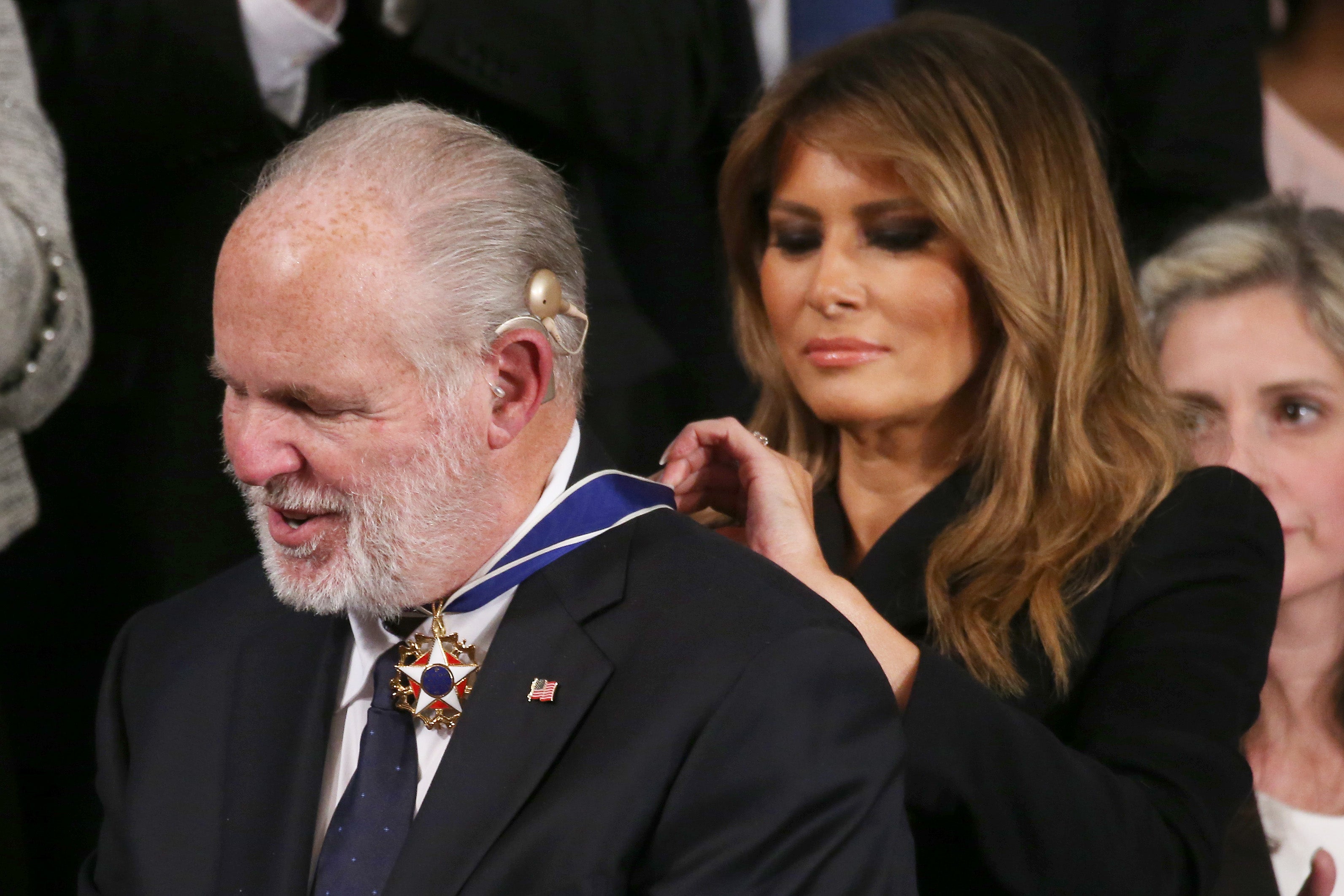Why I’ll miss listening to the bigoted and toxic Rush Limbaugh
Limbaugh was a shortcut to a worldview of many Donald Trump supporters, writes Andrew Buncombe


A couple of days after Rush Limbaugh died, I was driving out of Seattle when I spotted some people draping a banner from a footbridge.
“RIP Rush,” it said. “We will miss you.”
Strangely, I found myself thinking the same, though no doubt for very different reasons to the people on the bridge.
For more than three decades, Limbaugh, who was 70 and suffering from lung cancer, had churned out views that were racist, homophobic, misogynist and utterly toxic.
In the late 1980s and 1990s, he read aloud the names of people who had died from Aids, while playing songs such as “Kiss Him Goodbye”, and “I’ll Never Love This Way Again”. He insulted women, and claimed that Barack Obama was not born in Hawaii, and was not eligible to run for the presidency.
Perhaps more than anyone else in the industry, said media critic Jennifer L Pozner, he was responsible for the “mainstreaming of hate on the radio and the corporate media writ large”.
In essence, Limbaugh, who was born in Missouri, stood for just about everything The Independent seeks to stand against.
And yet, for a journalist such as myself, a correspondent from Britain, Limbaugh was very often a crucial window into a mindset and worldview, not only out of my comfort zone, but beyond my usual encounters.
Listening to The Rush Limbaugh Show, which attracted an audience of 15 million at the time of his death, provided a shortcut to hear the views and opinions of aggressively conservative and nationalistic Americans.
For the past four or five years, tuning into Limbaugh’s show and listening to his guests call in and sound off on whatever issue was firing them up that day, was to hear what many millions of Donald Trump’s supporters believed and thought. It was a quick way to get up to speed on the issues they cared about most.
Why does this matter?
Read more:
America is a vast place, with lots of different opinions on lots of different topics. For a journalist trying to write about a country, the first step is trying to understand and make sense of its people.
It is the same reason I listen to Sean Hannity and Tucker Carlson on Fox News, or make time for the podcasts of Michael Savage, Candace Owens, Ben Shapiro or Dana Loesch – to hear views, opinions and perspectives that are not my own.
I should make clear that I don’t go to these places in search of facts; since Ronald Reagan scrapped the Federal Communications Commission “fairness doctrine” in 1987, which from 1949 had required broadcasters to dedicate equal time to both sides of an issue, there has been no such rule.
Many news organisations and individuals still seek to focus on facts, and we have seen a growth in media fact-checking departments since Trump moved into politics, but Limbaugh was not one of them.
Rather, his speciality was to fire up and entertain his listeners, by picking on grievances and finding someone to blame, be it “media elites” or “feminazis”, one term he is said to have coined.
I am not suggesting journalists should listen to nothing but people like Limbaugh. Indeed, it can all get rather exhausting, on many levels. (My habit on assignments is to flip channels every 20 minutes from conservative talk radio to the local National Public Radio station, and then a third broadcaster, be it a sports channel or a local church broadcast.)
In many ways, Limbaugh’s routine was similar to that of Trump’s, though he did it for three hours a day, five days a week, and did so over a career that stretched decades. While Limbaugh was four years younger than Trump, his presence and influence among rabble-rousing conservatives long predated the former president.
It’s generally reckoned that without Limbaugh, there would have been no Bill O’Reilly, or Sean Hannity, and possibly no Fox News. And one can similarly question whether Trump would have been able to win the presidency without the unquestioning support of that channel. Trump surely owes his political success in part to the angry, fact-flexible environment Limbaugh helped create.
Trump seemed to believe so. In his 2020 State of the Union address, Trump honoured Limbaugh and said he was awarding him the Presidential Medal of Freedom. It was highly controversial, but Trump said it was in recognition for “the millions of people a day that you speak to and that you inspire”.
When Limbaugh died, Trump was interviewed by Fox News.
“He was with me right from the beginning,” he said. “And he liked what I said and he agreed with what I said. And he was just a great gentleman. Great man.”
In the meantime, readers of The Independent can rest assured, we will continue to hold facts dear, and stridently oppose the sort of bigoted views and opinions that Limbaugh loved to spew.
Yours sincerely,
Andrew Buncombe
Chief US correspondent
Join our commenting forum
Join thought-provoking conversations, follow other Independent readers and see their replies
Comments